Get posts by email
Learning to Read Part 2
November 16, 2010
Wow, what awesome feedback I got on Learning to Read Part 1. Thank you very much for sharing the stories of your own children learning to read. I gained a lot from your experiences.
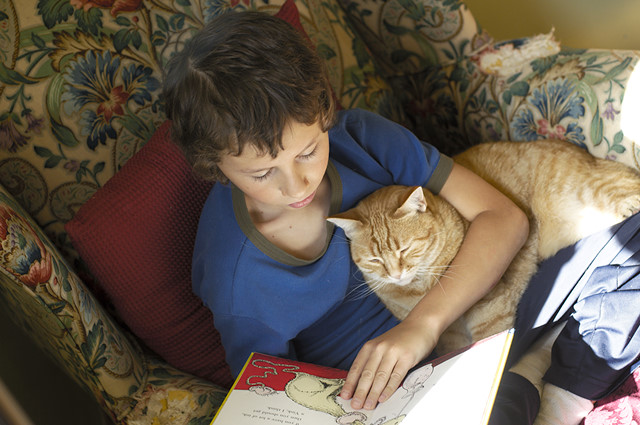
If you are just joining us, today's post is a follow up to Learning to Read Part 1 in which I summarized my teaching background and philosophy about reading.
In this post I will share our bumpy journey of teaching our children to read and list resources that might be helpful for your family. And don't look now, but there is a giveaway at the very end.
(And the story continues: the real reason our son struggled so much learning to read.)
Our Experience:
Let me first say that our children are not particularly precocious in learning to read, in spite of me reading to them almost every day for years and years. And modeling a love of books and the written word (I read almost every spare minute, like while brushing my teeth).
They love books, we visit the library each week and they often spend hours a day reading (the words or pictures, depending on their skill level) but that has not translated to early-aged reading. They have other interests and talents and we have not pushed them to read but have waited for the right opportunities to teach them as they have shown readiness.
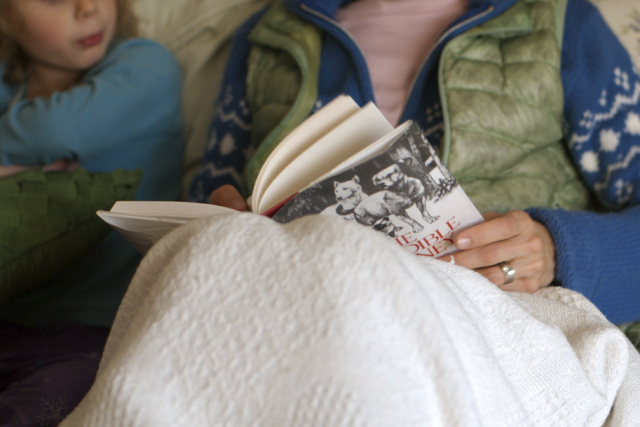
And yes, I do believe in teaching reading skills, at least in our family's case. Although I am a good reader myself and can "sound out" words I wanted to use an actual curriculum for our children. This is because I felt rather inadequate and freaked out about the process (you can read more of that in the first post) and wanted to make sure we were covering all the bases. With other areas of learning, like science for example, I don't feel the same inadequacy or need for guidance in these elementary years.
Also, I have not set out as an educational goal that my children develop a love for reading. Our educational goals are rather broad on purpose, to give our children room to be who God created them to be. Developing a love for something is very personal and I'd hate to feel like I've failed as a homeschooler and parent if one my children doesn't love to read. There are other things more important to love (like each other) and those are the areas we work hard to cultivate. But secretly, in my deepest heart, I do hope they grow up loving to read.
Teaching Celine to Read
Six years ago when I started to think about teaching Celine to read I honestly didn't know where to start. So I did what all homeschoolers do, I asked other homeschoolers.
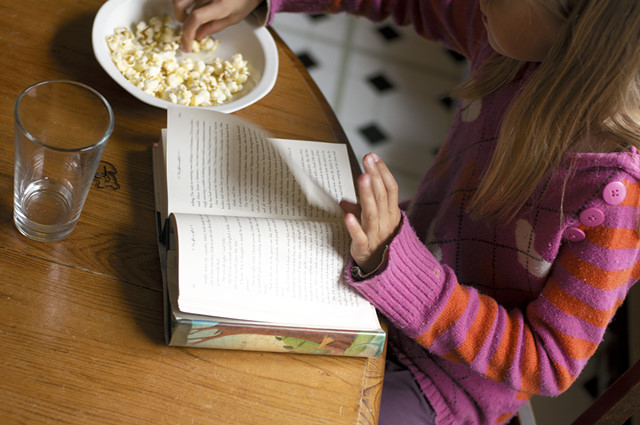
And this is what they recommended Teach Your Child to Read in 100 Easy Lessons. Problem was the program was so scripted, down to every detail, the thought of using it bored me to death. I do not like being told what to do and have a hard time "coloring in the lines" so to speak.
Although the program was inexpensive and straight forward and fairly guaranteed to work I couldn't see myself sitting down and using it. So I asked Damien to do it. And he did. There, that's the story of Celine learning to read.
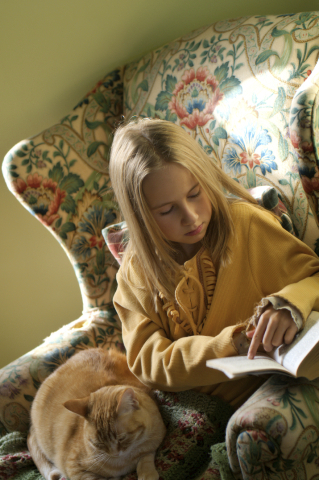
Well, there are a few more details. She was six at the time she started easily reading on her own (the lessons might have started when she was five, I can't recall). Celine was definitely ready to learn to read and might have been ready sooner though I wasn't (smile). She enjoyed this time with Damien and I loved watching my capable and steady (I'm a bit free-spirited shall we say) husband teach our daughter to read. They got to lesson 75, out of 100. Celine got bored with the lessons and was ready to fly on her own.
Celine has been a voracious reader ever since. I can barely keep up with sourcing good books for her to read. She especially loves certain kinds of fantasy and historical novels set in medieval Europe. On the subject of the middle ages in particular her knowledge vastly outshines my own. I supply a steady stream of living books on other topics to help round out her education a bit. See studying the world through reading and creative play for more details.
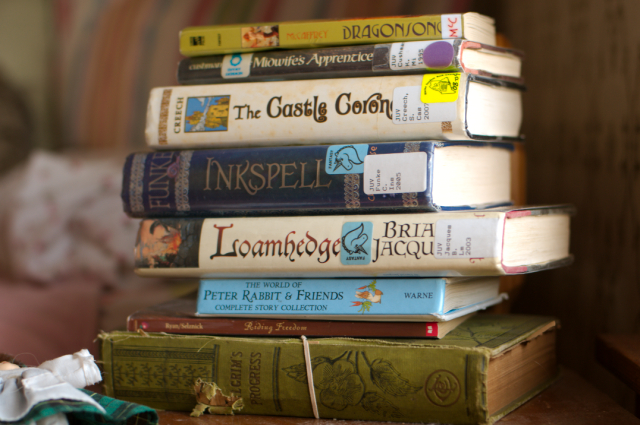
Celine's bedside table at 9 years old
Teaching Laurent and Brienne to Read
Laurent is a nature/adventure boy to the core and loves the graphic arts. Both his own pursuit of drawing and the appreciation of good illustrations. Therefore, although he is just now learning to read he has been immersed in books for a long time and has spent many hours "reading". His favorites are books with detailed graphics, books on nature and the outdoors, and whatever interests him at the time (castles, samuarai, swords, muskrats, ships, planes, cougars etc...)
Teaching him to actually read the words in these books is another matter entirely and hasn't been as straightforward as Celine's basic reading lessons.
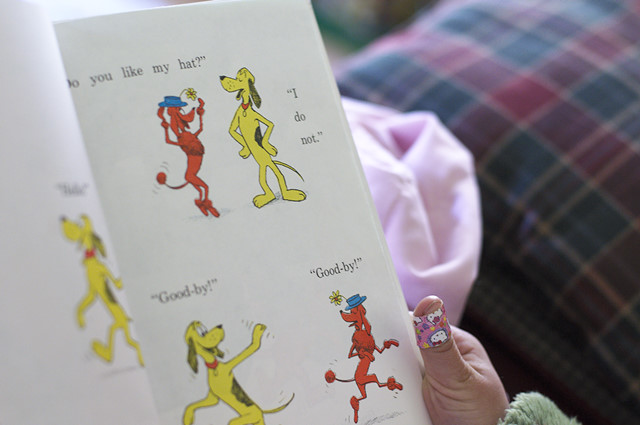
Brienne's learning-to-read experience tracks closely with Laurent's because we taught them both mostly at the same time. She seemed ready at a younger age than Laurent, as is often the case with little girls. She enjoys most anything I read to her but her own interest in books is fairly limited right now to princess, miniature creatures, and fairy stories.
First Attempt
We first started teaching Laurent to read when he was 6 1/2 with 100 Easy Lessons. Although he seemed ready, he's a bright, curious and intelligent kid, it was too soon. The draw for him of course was one-on-one time with Daddy. I'm not sure how far they got that go around but the lessons fizzled out after a couple months and Laurent's reading skills were very minimal and he still couldn't identify much of the alphabet. Those letters just could not stick in his brain.
Second Attempt
We let it rest till next fall when we started his grade 2 year. This time around Damien did the lessons with both Brienne and Laurent. Brienne was almost six years old, around the same age Celine learned to read. Long story short - the lessons weren't successful like they were with Celine. The kids appreciated that time with Daddy and but the skills they "learned" didn't translate into their everyday reading.
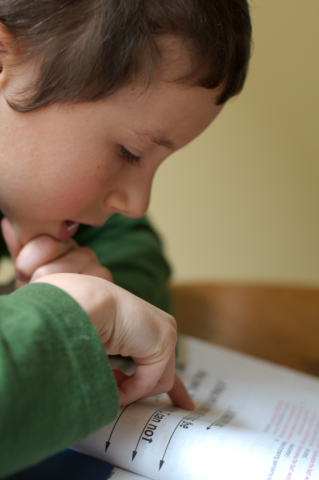
By Christmas the lessons had fizzled out with Daddy. I decided it was time to get over my aversion to the scripted program and give it a go in January. I did, for a month or so. The process wasn't too painful but once again, the lessons just weren't sticking. None of us were inspired nor was I very consistent with the lessons. We called it quits at about lesson 65 sometime around the arrival of spring.
And so it was last summer I shared about my reluctant readers. This is from a summary I wrote in Laurent's portfolio that month "Laurent... seems to lack the motivation to apply the reading skills he has learned". I'm not sure now if it was motivation, learning style, interest level or what. He just wasn't ready.
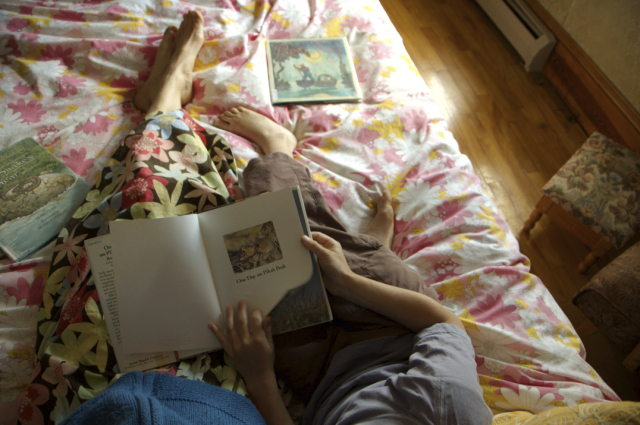
Third Attempt
I started last school year (Sept 2009-Aug 2010) gung-ho, as I usually am, to try again. This time I choose easy readers, no scripted lesson, and we'd sit down and practice together a couple times a week. The children would read one sentence, I'd read the next. I also printed off the list of dolch sight words from Jan Brett's site thinking that might help. By the end of September my new school year enthusiasm had worn off and I (book)shelved the very informal reading lessons, which none of us enjoyed very much anyway.
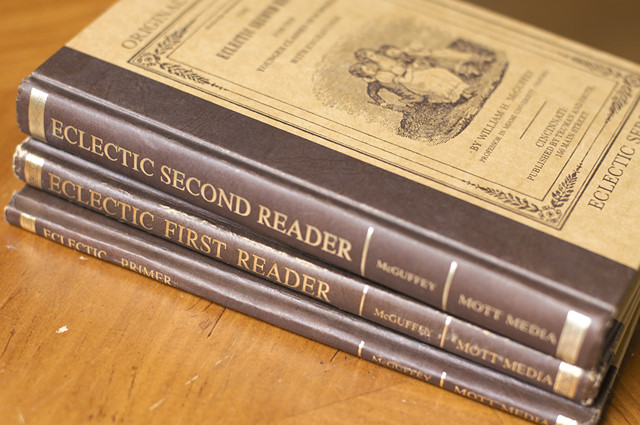
I picked it up again in January. Focusing my efforts on Laurent only we tried using McGuffey's Eclectic Readers. Although the readers progress logically from easy one word pages to multiple sentence stories, the old fashioned language was hard to make sense of and the lack of decent illustrations made it hard for my graphic artist child.
Finally, I let it all go and made the decision to wait until Laurent was really ready and asked us to teach him again.
The wonderful thing was that although we had tried reading instruction in fits and starts and I didn't feel very successful in that regard (yes, my kiddos had received hours of instruction but they still weren't reading independently) my children's love for books had not diminished.
We didn't push reading to the point of tears or frustration so though it seemed we hadn't gained much for our efforts we also hadn't lost anything and I felt we stayed true to my fundamental beliefs about reading.
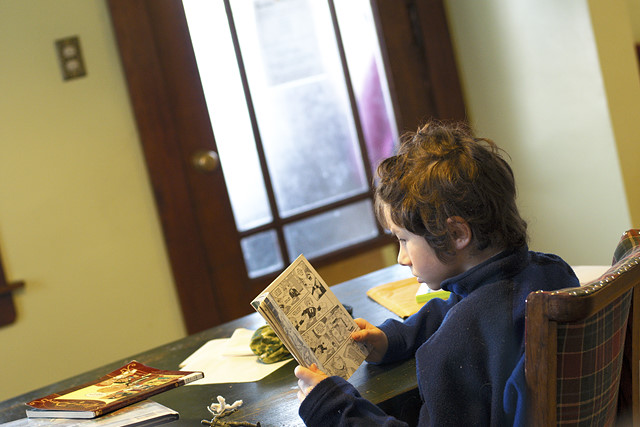
And so I waited. Occasionally, the younger two would read little bits here and there.
Then this past summer it happened. Laurent started to get frustrated about his lack of reading ability. There were words he wanted to read and couldn't and that motivated him. Sounding them out on his own was too difficult, he wanted my help with regular practice. I decided to wait till September, a month of new beginnings, to focus on reading instruction once again.
Fourth (& Current) Attempt
That brings the story to the present. This autumn I am focusing on reading practice with Laurent and Brienne.
Brienne and Laurent are like puppies. They are best buds and sometimes sparing partners but they share most of life together. Although Laurent was the one asking for instruction I added Brienne also. Her reading abilities are on par with his and I want to make the most of our sit down instructional time.
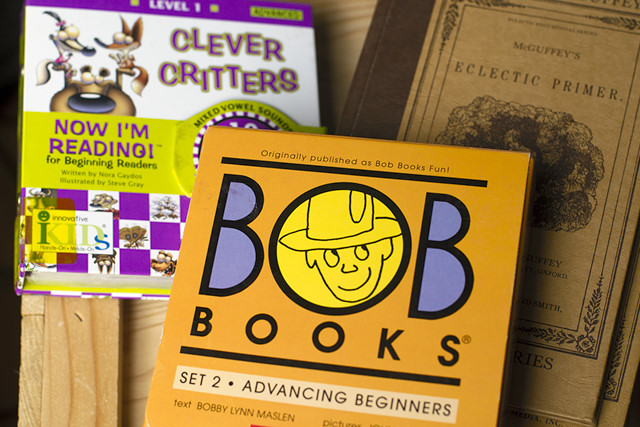
It's our top homeschool priority right now and we do it first thing after breakfast. You can read more about that strategy at Simple Homeschool.
They have had enough instruction in the past to know basic phonics rules. Now they just need to practice (and lots of reminders) to build their skill and sight word recognition.
We call it reading practice. They each take a turn with an easy reader and I keep it fairly short, 10 minutes each. After that, I read to them from our stack of library books. It is very cuddly, there are no tears, there are quite a few laughs, and progress is being made.
Hallelujah! Maybe I can lay my homeschool mama fears to rest. My eight year old and almost ten year old are finally learning to read.
Is there a moral to this story? I don't know. Maybe it's "better late than early" or "if at first you don't succeed try waiting 3 years".
What I do know is that our younger two are inching their way to reading on their own, independent of our practice together. But it's a much slower process than it ever was with Celine. And that's ok.
(I should mention that we went to the eye doctor recently for the kid's first ever visits and their vision is near perfect. This is important to check with late readers, maybe they just can't see well).
What we've used:
Here's the list of what we have used over the years. Both successfully and unsuccessfully.
- Starfall - A free website to teach children to read with phonics.
- Teach Your Child to Read in 100 Easy Lessons - This program worked wonderfully for Celine, not so much the younger two.
- McGuffey's Eclectic Readers - We didn't like them but some people do. I have the first three, want them?
- Bob Books - Used the first two sets early this fall. Nice and easy.
- Nora Gaydos' "Now I'm Reading" phonics based easy readers - These have been a hit in our house this fall. There are several series of these, starting with very simple words and moving to multi-sentence pages.
- Dr. Suess Beginner Books - Current reading material.
What other people have to say:
- Children Teach Themselves To Read @ Psychology Today
- Teaching My Child to Read @ The Roots of Simplicity
- Learning To Read @ Mt. Hope Chronicles
- Homeschool Nitty Gritty: Kindergarten or 1st Grade @ small things
- Unschooling: Learning to Read @ Clean
Just one more. The Way They Learn is a book I just finished reading to help me better understand multiple learning styles. This is not a how-to-teach reading book per se but has given me much greater insight into my children's individual giftedness and why reading does not come as easy to Laurent as it does Celine. Highly recommend.
Giveaway:
Thanks for hanging in there with me on this post. It's one of the longest I've ever written.
Do you have children you are teaching to read? Want to try Teach Your Child to Read in 100 Easy Lessons? Like I said, it worked beautifully for Celine but not so much for my other two. The value of the book new is about $20 and I'm giving it away for free. If you'd like a chance to win it please leave a comment. Winner will be chosen randomly Sunday, November 21st.
Other comments and feedback also welcome.
Filed Under
Resource Library
-

Bryssy on Nov. 16, 2010, 11:43 p.m.
I am so stressed about teaching my 5 1/2 to read. A friend of mine is using Teach Your Child to Read with her 4 and I'd like to try it. We've tried some other things, too. I've been anxiously awaiting this post - and yes, maybe we should wait. Her non-reading is stressing me out, but doesn't bother her. I feel like all eyes are on me to teach her to read in Kindergarten like they do in public school. I lay awake nights and worry about it. Can I do it? Did we make the right choice to homeschool? I hope and pray so.
-

renee on Nov. 17, 2010, 1:17 a.m.
Oh hon, (and I mean this in the kindest, most understanding way possible) you need to relax. I totally understand stressing about reading, or non-reading. I've done my share of that. But what I've done while waiting for reading to really catch on with my younger two is observe and record all they are learning and doing. Which is really a lot.
Also, if it makes you feel any better the certified teacher who has done our year end assessments for the past three years wasn't worried about it. Having that independent opinion mattered, even though I know it shouldn't.
Your daughter has many years ahead to learn to read, truly. Don't compare yourself to other families, walk your own path. The path best for your daughter's individual needs.
Yes you can do it!
-

Bryssy on Nov. 17, 2010, 9:36 p.m.
I know your right. Relax. I am actually a certified teacher who quit teaching to stay home and homeschool - so I am putting the pressure on myself. My husband isn't worried. No one else seems to be - just me. I know she'll come to it. I read when I was 4 so I guess I just expected she would, too. We have been having a grand time homeschooling and all of us are learning so much - our family has never been happier. Thanks for your kind words!
-
-
-

Amanda Anderson on Nov. 17, 2010, 12:02 a.m.
If there's one thing that I've learned through motherhood that is truly important (and that no one taught me in graduate school--I'm a Developmental Psychologist) is that maturation is EVERYTHING. Potty training a kid who's too young is a lot more work and only marginally successful. Imagine trying to teach an infant to write the alphabet. Obviously, the motor skills aren't there, they don't know what letters are, let alone how to form them. Equally, trying to teach a kid who's just not ready is like pulling teeth. It can work, but it's a huge frustration. When they're developmentally ready, it flows so naturally. 2/3 of my children (the little one is a little too little) pretty well taught themselves to read, and I firmly believe that it's just that they were cognitively in the right place and in a language-rich environment.
-

Naomi on Nov. 18, 2010, 2:03 a.m.
That is SO true! I've taken this lesson to heart in many aspects of parenting little kids. Potty training, baby-led weaning, starting solids, sleeping in big bed, playing with other kids, learning the alphabet, etc. Being laid back about a lot of things is such a peaceful way to parent children, and the goals are still met!
-
-

Sea on Nov. 17, 2010, 12:05 a.m.
Renee- I read your first post and I enjoyed this one just as much. I mentioned before my 3 kids are different and my boy who is 8 just picked it up. As a reading teacher I know the expectations our schools have and I think it is a gift as a home-schooler you gave your children time and space, and there is no reason to push and make tears- this would likely make them not want to read! At a public school the kids can be put under much pressure and undue stress on parents when there child is not 'where' they should be. With having had some training on brain research we know the majority of kids can learn to read at a young age (with specific guidance), but we have not waited for the outcome if it makes them enjoy reading. Reading is for pleasure and learning and that is a message we need kids to understand I think! I think you've done great by your kids, each one needs something different!
-

Seastar on Nov. 17, 2010, 12:07 a.m.
My oldest didn't even get formal reading instruction. She just taught herself while I read lots and lots of books to her. She was motivated to learn because there was a computer game we told her she could play once she could read. One day she just started reading and hasn't stopped.
My boys on the other hand are taking a lot longer to catch onto reading. I checked out 100 easy lessons and also the Ordinary Parent's guide to teaching reading. I too didn't enjoy the scripted lessons. That is just not how I do much of anything. For my older boy we started doing Explode the code primers. This worked for him. He still does them in fact. We have been through the primers and are up to book 3 now. He actually spells better than my daughter who hasn't had any phonics training. Not that that was my goal but just something I have noticed. We will continue until he tells me he is done. But he is reading better and better all the time.
My 2nd son has also been doing Explode the code and it is working pretty well for him as well. We also picked up the Bob Books which he likes. And all my kids read out of the McGuffey Readers. We actually don't mind the old fashioned language. They often read aloud with a British accent because they seem so proper. We have read a lot of books aloud with accents so my kids have caught on to that, I guess.
-

Kimberly on Nov. 17, 2010, 12:28 a.m.
Hah! I LOVE to read. ALL THE TIME!! I bought the 100 Lessons and have done...none. Granted, I've just had a baby and the eldest wants to be reading is just about 5 and we are moving again. I just can't seem to get started with the lessons as well. I taught for years and love scripted math (saxon) but not so much with reading. I mentioned to my husband the other day that he should do the book with my son. Now I think I will REALLY encourage him!
-

Hillary on Nov. 17, 2010, 1:28 a.m.
I devoured this post! My oldest is six and I haven't thought about it at all until recently when I had my first doubts, "ugh, am I sure I know what I'm doing?"
The thing that got me thinking is that he spoke at an early age and has an uncanny ability to use a wide and impressive vocabulary and I just started thinking that maybe he'd be reading if I was presenting it right.
So far we're just reading. He has, at different times, noticed different letter combinations and punctuation marks and asked questions about them and pointed them out. But every time I try to point something out or show him something he immediately stops wanting to know. Our reading time together has been cut short lately with the new baby and a high needs three year old around and one day while he was waiting for me I mentioned about how I remember loving learning to read because I didn't have to wait for my mom to read to me. He was definitely curious and I simply offered to teach him whenever he was ready. I'll be excited when he's ready and I might look into some of the resources you and the other commenters mentioned.
Thanks Renee!
-

Mel on Nov. 17, 2010, 1:49 a.m.
Great post. My almost-4-year-old could read three letter words before he was three. He knew the sounds of letters and could identify all the letters of the alphabet. We never pushed him, but made sure to provide tools when he was curious (there are some great abc and alphabet sounds videos on YouTube). He goes in fits and starts, and now seems to be sounding out words to himself when he is "reading." My two-year-old can sing the abc song, but not id the letters.
But, they are both great where they are. I think you are right on letting kids pick the speed they want to learn to read and realizing that what works for one might not work for the other(s). You really have to know your kids and they're learning styles. I'm definitely going to check out the book you mentioned.
(Long post = long comment ;)
-

Shannon on Nov. 17, 2010, 2:03 a.m.
I couldn't agree more. Although I try to relax about it, at times I do doubt my ability as well, and start to second guess myself. Winter is coming and I'm looking forward to cozy times, addressing this topic more in depth with my son. Thanks for telling me what has and hasn't worked for you!
-

Naomi on Nov. 17, 2010, 3:37 a.m.
I've been reading a lot about kids who delay formal learning and do just as well as any other, but it sure is encouraging to see people I know learn this way and see how wonderfully they are growing! Thank you for sharing your stories, and I will be saving this link to check into all the resources. Laurent and Brienne must be excited, becoming so accomplished!
-

Marianna on Nov. 17, 2010, 3:43 a.m.
Wonderful post! I'm a huge proponent of letting kids learn in their own time. Having said that, not all kids will learn naturally, and I encourage parents to trust their instincts if they feel there is a problem beyond simple readiness. I have two children with two wildly different experiences.
My oldest (now 11) is dyslexic and struggled mightily in the early grades. In my heart I knew there were problems, but let teachers convince me he "just wasn't ready." A child (by the end of 1st grade) who does not remember simple sight words within the same reading passage, confuses words such as what and that, when and then consistently, skips "filler" words like a, the, it etc. should be screened for dyslexia. Contrary to popular opinion dyslexia is much more complicated than simple letter reversals! I'm extremely grateful that he is now a voracious (if slow) reader and self-identifies as a reader.
My youngest self-taught. One day when she was just over five I was quizzing the oldest on spelling words (which he couldn't spell!) and she was getting every single one of them. I picked up a simple picture book and asked her to read a couple of sentences, lo and behold she could. At eight she is now reading well above "grade" level. Unfortunately, she isn't a reader! Every once in a while she will find a book that she loves and read for hours on end, but it doesn't happen often enough for this book lovin' momma.
I continue to model good reading habits, and limit technology, hoping it's just a matter of time before she too will become a voracious reader!
Good luck with your little ones.
-

renee on Nov. 17, 2010, 12:10 p.m.
Marianna,
Thank you for sharing your experience. I have wondered if Laurent has dyslexia or so some other reading problem. But I didn't want to assume that just because it was difficult there was a problem. So we are going to see first if consistent practice (like we are doing now) helps. If not I have considered getting him tested, Damien is very hesitant about this as he doesn't want our children labeled (smile) which is one reason we have taken a "wait and see" approach. But if his brain is wired differently I'd hate to deprive him of learning techniques that will help him.
Thanks again for sharing. I have learned so much from people sharing their personal stories.
-

Naomi on Nov. 18, 2010, 2:07 a.m.
I would betsome learning techniques for dyslexia could easily be incorporated into your schooling without having him "diagnosed". Perhaps they would be helpful even if he wasn't wired differently?
-

renee on Nov. 18, 2010, 2:32 a.m.
Without having him diagnosed I'm not sure how I know it's truly a problem, and not just a lack of interest or "not-readiness". If I could learn some techniques that would be helpful I would definitely be open to trying them. Right now we'll wait and see and watch if what we're doing sticks. If not I will give more thought to learning other techniques I can use to help him/he can use to help himself.
-
-

Marianna on Nov. 18, 2010, 4:01 a.m.
We were (still are really) also very hesitant to have a label, and waited until 3rd grade (he was 9) before taking any formal action. I finally reached a point where I just knew we had to figure out what was going on as his reading/spelling/writing skills did not jive with his obvious intelligence.
My children are in public school so in the end having the label has benefitted him in that he is allowed accomodations (the biggest one being that his teachers do not penalize him for spelling!) that have let him keep his focus on learning without worrying about getting everything "right."
-
-

Kelly on Nov. 18, 2010, 2:58 a.m.
Thanks Marianna, this is helpful information! My kids are too little to learn to read but my husband (who is dyslexic) and I used to teach at a "free school" (kind of like unschooling but at school!) and we had some concerns about kids who may have had learning disabilities. I have a lot of faith in children and don't believe in rushing them, but I agree with you that we should listen to our instincts about whether there might be another problem.
-
-

Rana on Nov. 17, 2010, 4:33 a.m.
Renee, I have been waiting for this post. I have a copy of 100 lessons and it started okay with my daughter, but we lost interest. I didn't even attempt it with my son. We moved on to just reading easy readers like Dick and Jane and Dr. Seuss and I found Progressive Phonics which my daughter loves and now she is reading really well. My son on the other hand didn't do as well with Progressive Phonics so we tried Explode the Code. He likes to do the worksheets, but he still get's frustrated with it. So right now I am just reading a lot of stories and he reads a bit of Dick and Jane to me and we play a lot of games with flashcard words and I made up memory games with the words too. The twins are 7 now and I was getting worried about my son not reading, but I understand that everyone reads at their speed and as long as I keep reading to them it will come. Thanks for sharing your resources too.
Quick question, now that reading is going pretty well what do you do about writing? I'm looking for some ideas. Right now they do a couple of sentences a day telling me what they understood from a bible story that I read to them. Usually I dictate and they copy. They also write thank you cards and simple notes to family out of town. Might you or anyone else have any suggestions on other writing ideas? Thanks!
-

renee on Nov. 17, 2010, 12:13 p.m.
Writing - now that is a whole different post I've been working on in my head for months. That probably won't get published till after Christmas. But my quick, quick answer is we do compositional writing on the fly, like everyday writing letters, party invitations etc... I will sometimes write down their story dictations most often I just listen (in Celine's case). And we practice the mechanics of handwriting using getty dubay.
-
-

Dee on Nov. 17, 2010, 12:13 p.m.
This is such a great post! My 5 y/o, Finch, is learning to read right now. I started out with "The Ordinary Parents Guide to Teaching Reading" but found it too boring and scripted. We also tried HeadSprout and Reading Eggs but he didn't like doing things online. I decided to give it one more try with Bob Books which he likes much much better. He proudly told his grandmother that he could read yesterday and pulled out a Bob book to read to her! And one more thing: not everyone will be interested in television as an option for reading help, but for those who are, I highly recommend the Leapfrog Letter Factory dvd. I saw it recommended on a message board and played it occasionally for Finch. The letters and their sounds are sung during the movie and I really believe this helped him to learn them well!
-

Nicole on Nov. 17, 2010, 2:12 p.m.
Thanks for this follow up post! I love hearing about what works for other families. We too tried different workbooks but it always fizzled out. All five of my girls learned at different ages (one read at around age 9 but it still took a few more years until she read for pleasure - I worried about that for a long time but now I see she just had her own pace). My son (age 8) is not a reader yet, (he knows letters and some words) but his interest in learning himself is just starting now. In our case, what seemed to work is finding books that they really loved, what subjects really interested them, and then they wanted to learn (and read) more about it themselves without waiting for me :) (As for writing we did some copy work - I would get them to tell me a (very) short story and write it out for them and then they would copy it, add pictures and make a book out of it. It seemed to really keep them interested because it was their own work. We also do a lot of informal writing - lists, etc. - Just my 2 cents :)
-

renee on Nov. 17, 2010, 3:33 p.m.
Thank you for your 2 cents - they are just as valuable (more than 2 cents I think) as any one elses.
-
-

Jenn on Nov. 17, 2010, 3:18 p.m.
Oh, my. We read 'Fun with Pets' from Abeka. It has taught every one of my children to read. We LOVE IT! After they graduate from that book (they always finish it!) we move on to easy readers. Gosh, your story is so much similar to mine. Maddie took off reading at age 4. Sam was almost 9. It's O.K. if they are almost nine and just starting to read!!! It really is! :0) Sam is now a voracious reader. I cannot keep him supplied in medieval, gardening or survival books! :0)
-

Tracy on Nov. 17, 2010, 5 p.m.
Thanks for this info Renee. I have two children who were "late bloomers" when it comes to reading, which so surprised me because they were so precocious in everything else (talking, logic, vocabulary) and they so loved books. In both cases, things finally "clicked" and away they went! My other child is another story. Very bright, but with some learning difficulties; reading just seems so much trouble for him that he refuses to even try. He constantly guesses what word is on the page, using context if possible but never actually sounding out any word from the beginning to the end. At this point, the books he +could+ read are so boring to him that he really has no desire at all. I plan to try the book about learning styles that you suggest, but I wonder if it is all about learning difficulties. I'd certainly try the 100 Easy Lessons. I would try almost anything at this point! Thanks, Tracy
-

Jacinda on Nov. 17, 2010, 8:12 p.m.
Oh i love the sense of spaciousness and time in this post...the stressful worrying doesn't come through. What comes through is your trust in your children. Our girls are 7 and 5. We have been sporadically doing"100 easy lessons" with 7 year old and 5 year old jumped on too. I loved the scripted-nature of it. I didn't have to think through something! Yay! 7 year old is losing interest and wants more books with stories and a sense of going somewhere. 5 year old likes the methodical approach of "100 easy lessons." There is no rush for either.
-

Kika on Nov. 17, 2010, 8:54 p.m.
My five year old is, I think, mostly learning to read by learning to spell! She wants to write words all the time and works at sounding them out and has read some of the beginning Bob books. But mostly, it seems to me at this time, I think she is developing her reading skills by writing. This is different from my experience with my older two. Fun to watch.
-

Ginger Allman on Nov. 17, 2010, 9:44 p.m.
Laurent is a very lucky boy that you are homeschooling. Had he been in the public schools, he would have been branded as a slow learner and his wonderful self esteem would have been damaged by the system's inability to accommodate his atypical maturity path. Kids learn in their own time, on their own schedule. I mean, you still check for the obvious (ears/eyes/mental development) but once you're clear on that there's not much else to do but love them and provide a fertile environment for them to take off when they're ready. And this applies to other things too, whether it be physical skills or writing or the ability to stay on task. All in due time.
-

renee on Nov. 17, 2010, 10:08 p.m.
This is something we have thought so many times - how would he manage in school? He is such an intelligent, talented and all-around great kid (I know I'm biased but many non-biased folks have told me as much) I can't imagine him feeling anything less than good about who he is. I'm so thankful I can shelter him from that.
But also, as Granola Girl pointed out in my previous post in the comments, schools can be good for detecting and diagnosing certain problems and using specific strategies that address those issues. Even so, I'd still rather have him at home with self esteem intact.
-
-

Jacqueline on Nov. 18, 2010, 1:36 a.m.
Thanks for this post. My 9 year old daughter is still learning to read and I really enjoyed hearing what you've tried and what worked, etc. I too am very thankful we're homelearning and have the freedom to wait until she's ready! Thanks for sharing your journey!
-

renee on Dec. 9, 2010, 3:36 p.m.
Congrats Jacqueline. 100 easy lessons on its way to you.
-
-

Kelly on Nov. 18, 2010, 3:10 a.m.
Renee, you have given your children such a wonderful gift to allow them to develop at their own pace! The human mind is amazing, and there are children who teach themselves to read at age two (my brother-in-law!) and at age 12, and I really think either is just as well! I feel so sad for the many many children in our country's schools who are labeled as poor readers, below grade level, etc. and who will forever carry that feeling of not being good enough in their hearts. The truth is that children will eventually learn to read, that they will be motivated to do so because we live in a world of print, and that non-readers can be learning just as much as readers through all their interactions with the world. Your comment that you do not have a goal of teaching a love of reading really got my attention. I had never thought of it that way before, but I think you are spot on. Reading is a tool that everyone should have at their disposal, but there's no reason why everyone should have to love doing it! But one thing I look forward to as my kids get older is getting more time to read myself. :)
-

Jessica on Nov. 18, 2010, 11:42 a.m.
This was a very interesting post. I have three avid readers, but one was more reluctant than others. I am a VERY determined kind of girl: we have a program, we follow it. But I had become wise (read OLD) enough by my third child to know to leave well alone. Children one and two were a BREEZE, like Celine. I taught my son with no pain; my daughter actually taught herself at age 4 1/2, by listening to my son's lessons and by asking around (any living being pretty much) what would these two letters sound like, etc. Interstingly, they learned in one language (the one where we live and attend school) and managed to teach themselves to read in English, on their own. My third child, though, was just NOT interested. Not in writing, not in reading. So I didn't force her (like I would have LIKED to do but saw was not going to get us anywhere). She attended first grade and learned like everybody else does here, through her teacher. She is the only child we have actually had to have reading practice with. But still, she wasn't that interested at all. This year though... something bit her and she caught the 'book devouring' bug. Not sure what happened, but one day she decided she was going to read. She started with itty bitty books and got soon bored. She moved to some of her siblings books (she is 7, they are 10 and 13), reading sections of suitable and interesting books. And now? She ditched the primary language reading, taught herself to read in English over the summer, and is about half way through 'Charlotte's Web'. On her own. She picked it and started reading. She occasinally comes for words like 'bloodthirsty' and 'gloomy' but that's it. All this to say, there is no hard and fast rule it seems: the kids are all different and do differen things. And now? I have a 4 1/2 years old boy DIEING to read, DIEING to do math... Go figure... And I wonder how my newborn will be, when it is his turn to learn to read? It's an adventure!! Thank you for sharing your philosophy and stories about reading: I really enjoyed them!
-

Heather on Nov. 18, 2010, 3:16 p.m.
I have read a lot about this book, and am definitely interested. Of course, I maybe a bit ahead of my time for it, as my daughter is just 2 and a half, but, I like to prepare things way. in. advance. :-) She loves me reading to her though, and I definitely want to have a game plan when she wants to read on her own. Thanks for this opportunity!
-

Julia on Nov. 20, 2010, 8:55 p.m.
A friend of ours said he learned to read when he was 9. He just finished his PhD and moved away to start a new job at a university in South Dakota.
Thanks for sharing your teaching experience--fascinating. We are working with our second child this year who is learning to read at home and in kindergarten. I think her older sister has taught her as much as (or more than?) anyone else!
-

Dana on Jan. 10, 2011, 12:02 a.m.
Oh how I relate! My third boy, age 10, is finally really reading. In August, I told him that this was his year; he was going to take off. (And then I prayed I was right. Lord help him!)He was bummed his younger sister by 3 years was reading better than he was. All About Spelling was our key. I had researched different approches and the spelling to reading approach (the one I had yet to try)was the key. We started 3 years ago with this program taking small steps, short lessons and lots of review. I'm guessing it will take us another year to get him up to grade level, but I am so grateful for this program. Biggest hurdle was not feeling like a total failure as I waited for him to mature. I am so thankful he is at home where he it is safe to mature without the fear of being labeled. Cheer's to you patient mama!
-

Michelle G. on Nov. 6, 2011, 4:23 a.m.
My oldest two (girls) practically started reading on their own and then my boys came along and it's been a real struggle to teach them how to read. It's so nice to hear other's stories and know that I'm not alone. My 8 year old is only reading level 1 readers and my 6 year old is still having to sound out words like "cat" and "bat". I'd be lying to say I don't worry, but it's posts like this that help me not panic and send them to school.
You can subscribe to comments on this article using this form.
If you have already commented on this article, you do not need to do this, as you were automatically subscribed.






Kari on Nov. 16, 2010, 10:30 p.m.
This was so encouraging to hear! My eight year old daughter is just now fluently reading on her own. We went through the same trial and error with many programs, including How to Teach Your Child to Read, and it didn't work for us. Sometimes its hard to let go and not feel the pressure of what a school system says an eight year old or 'third grader' should be doing. We are also running into the same problems with math. We have tried many programs but the concepts are just not sticking! She memorizes math facts but she just doesn't understand it. Any suggestions?
Chris on Nov. 18, 2010, 11:51 p.m.
My daughter (8 years old) also was struggling with math. Tears every day and calling herself stupid. We are now using 'Right Start Math' and it is basied on Asian stle learning. She now is enjoying her math time and can even add faster than her 13 year old brother. It is quite expensive though, so that is always omething to consider.
renee on Nov. 18, 2010, 11:58 p.m.
We use Math U See and our family really likes it. "It really makes sense", my 11 year old says.
I think Math U See is more about concepts, like understanding that numbers represent things, than memorizing math facts. Other people and friends of mine haven't had as much luck with it though. We really like it and it's what I would recommend.